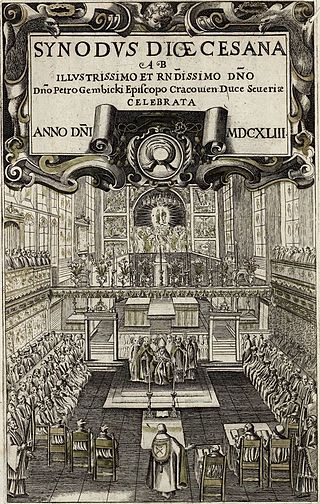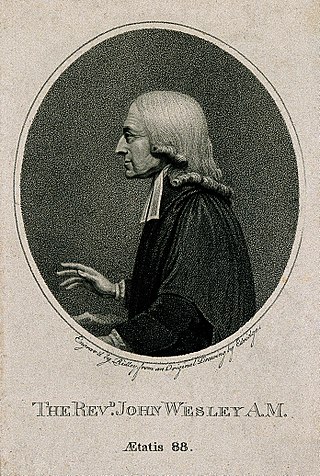
A parish is a territorial entity in many Christian denominations, constituting a division within a diocese. A parish is under the pastoral care and clerical jurisdiction of a priest, often termed a parish priest, who might be assisted by one or more curates, and who operates from a parish church. Historically, a parish often covered the same geographical area as a manor. Its association with the parish church remains paramount.

A synod is a council of a Christian denomination, usually convened to decide an issue of doctrine, administration or application. The word synod comes from the Ancient Greek σύνοδος 'assembly, meeting'; the term is analogous with the Latin word concilium'council'. Originally, synods were meetings of bishops, and the word is still used in that sense in Catholicism, Oriental Orthodoxy and Eastern Orthodoxy. In modern usage, the word often refers to the governing body of a particular church, whether its members are meeting or not. It is also sometimes used to refer to a church that is governed by a synod.

The Reverend is an honorific style given before the names of certain Christian clergy and ministers. There are sometimes differences in the way the style is used in different countries and church traditions. The Reverend is correctly called a style, but is sometimes referred to as a title, form of address, or title of respect. The style is also sometimes used by leaders in other religions such as Judaism and Buddhism.
A vicar is a representative, deputy or substitute; anyone acting "in the person of" or agent for a superior. Linguistically, vicar is cognate with the English prefix "vice", similarly meaning "deputy". It also refers to a senior priest in the Church of England. The title appears in a number of Christian ecclesiastical contexts, but also as an administrative title, or title modifier, in the Roman Empire. In addition, in the Holy Roman Empire, a local representative of the emperor, such as an archduke, could be styled "vicar".
An ecclesiastical province is one of the basic forms of jurisdiction in Christian churches, including those of both Western Christianity and Eastern Christianity, that have traditional hierarchical structures. An ecclesiastical province consists of several dioceses, one of them being the archdiocese, headed by a metropolitan bishop or archbishop who has ecclesiastical jurisdiction over all other bishops of the province.
Canon is a Christian title usually used to refer to a member of certain bodies in subject to an ecclesiastical rule.

In the Catholic Church, a religious order is a community of consecrated life with members that profess solemn vows. They are classed as a type of religious institute.
A provincial superior is an officer of a religious institute acting under the institute's Superior General. A provincial superior exercises general supervision over all the members of that institute in a territorial division of the order called a province, which is similar to, but not to be confused with, an ecclesiastical province. Instead, the province under a provincial superior is one made up of particular churches or dioceses under the supervision of a Metropolitan Bishop. The division of a religious institute into provinces is generally along geographical lines and may consist of one or more countries, or of only a part of a country. There may be, however, one or more houses of one province situated within the physical territory of another since the jurisdiction over the individual religious is personal, rather than territorial. The title of the office is often abbreviated to Provincial.
A vicar general is the principal deputy of the bishop or archbishop of a diocese or an archdiocese for the exercise of administrative authority and possesses the title of local ordinary. As vicar of the (arch)bishop, the vicar general exercises the (arch)bishop's ordinary executive power over the entire diocese and, thus, is the highest official in a diocese or other particular church after the diocesan bishop or his equivalent in canon law.
The hierarchy of the Catholic Church consists of its bishops, priests, and deacons. In the ecclesiological sense of the term, "hierarchy" strictly means the "holy ordering" of the church, the Body of Christ, so to respect the diversity of gifts and ministries necessary for genuine unity.

A dean, in an ecclesiastical context, is a cleric holding certain positions of authority within a religious hierarchy. The title is used mainly in the Catholic Church, the Anglican Communion, and many Lutheran denominations. A dean's assistant is called a sub-dean.
A consultor is one who gives counsel, i.e., a counselor.
A provost is a senior official in a number of Christian churches.
A deanery is an ecclesiastical entity in the Roman Catholic Church, the Eastern Orthodox Church, the Anglican Communion, the Evangelical Church in Germany, and the Church of Norway. A deanery is either the jurisdiction or residence of a dean.
A superiorgeneral or generalsuperior is the leader or head of a religious institute in the Catholic Church and some other Christian denominations. The superior general usually holds supreme executive authority in the religious community, while the general chapter has legislative authority.
The Very Reverend is an honorific style given to higher-ranking members of a clergy. The definite article "the" should always precede "Reverend" when used before a name, because "Reverend" is an honorific adjective, not a title.
Prior is an ecclesiastical title for a superior in some religious orders. The word is derived from the Latin for "earlier" or "first". Its earlier generic usage referred to any monastic superior. In abbeys, a prior would be lower in rank than the abbey's abbot or abbess.

The Anglican ministry is both the leadership and agency of Christian service in the Anglican Communion. Ministry commonly refers to the office of ordained clergy: the threefold order of bishops, priests and deacons. More accurately, Anglican ministry includes many laypeople who devote themselves to the ministry of the church, either individually or in lower/assisting offices such as lector, acolyte, sub-deacon, Eucharistic minister, cantor, musicians, parish secretary or assistant, warden, vestry member, etc. Ultimately, all baptized members of the church are considered to partake in the ministry of the Body of Christ.
Precedence signifies the right to enjoy a prerogative of honor before other persons; for example, to have the most distinguished place in a procession, a ceremony, or an assembly, to have the right to express an opinion, cast a vote, or append a signature before others, to perform the most honorable offices.
This is a glossary of terms used within the Catholic Church. Some terms used in everyday English have a different meaning in the context of the Catholic faith, including brother, confession, confirmation, exemption, faithful, father, ordinary, religious, sister, venerable, and vow.






